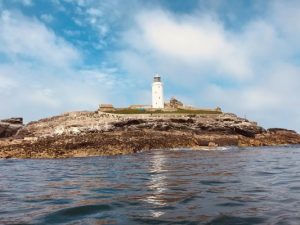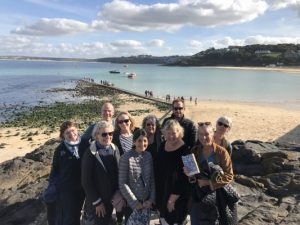Virginia Woolf’s To the Lighthouse – four day study in St Ives
Event Details
It has become a Salon tradition to spend some time each year in St Ives reading Virginia Woolf’s work and enjoying a place she loved and in which
Event Details
It has become a Salon tradition to spend some time each year in St Ives reading Virginia Woolf’s work and enjoying a place she loved and in which she spent significant parts of her childhood. In 2023 we will offer two Woolf studies in St Ives: Between the Acts (30 September to 3 October) and To the Lighthouse (5 to 8 October).
The Cornish coastal town of St Ives serves as a prism through which we will explore Woolf’s perspectives on landscape, domesticity and identity in To the Lighthouse. We have already completed four magical journeys through this book in the environment that inspired it – this is an incredible experience!
Toby Brothers explains: “This is something I have dreamed of doing since I first read Woolf’s magical book To the Lighthouse – it has haunted me always. The opportunity to study this work with a keen group of minds in the place that is so crucial to the writing is simply delicious.“

During our visit you will have the opportunity to visit the iconic Tate St Ives gallery overlooking the Atlantic Ocean, built between 1988 and 1993 on the site of an old gasworks. If weather allows, there will be an optional boat trip to Godrevy Lighthouse and we also hope to look at Talland House, Woolf’s childhood summer home (now privately owned). For several months of the year the elegant house overlooking St Ives Bay would be the Stephens’ family home until 1895 when Virginia’s mother, Julia Stephen, died. Although the complete family never returned to St Ives following their mother’s death, her children travelled back in 1905 following the death of their father in 1904.

“What is the meaning of life? That was all – a simple question; one that tended to close in on one with years, the great revelation had never come. The great revelation perhaps never did come. Instead, there were little daily miracles, illuminations, matches struck unexpectedly in the dark; here was one.”
Virginia Woolf, To the Lighthouse
“If life has a base that it stands upon, if it is a bowl that one fills and fills and fills – then my bowl without doubt stands upon this memory. It is of lying in bed, half-asleep, half awake, in bed in the nursery at St Ives. It is of hearing the waves breaking, one, two, one, two, and sending a splash of water over the beach; and then breaking, one, two, one two, behind a yellow blind . . . If I were a painter I should paint these impressions in pale yellow, silver, and green. There was the pale yellow blind; the green sea; and the silver of the passion flowers.”
“Here is the past and all its inhabitants miraculously sealed as in a magic tank.”
“The past only comes back when the present runs so smoothly that it is like the sliding surface of a deep river. Then one sees through the surface to the depths. The past sometimes presses so close that you can feel nothing else.”
—Virginia Woolf, “Sketch of the Past”, begun in June 1939
Feedback from participants in 2022 St Ives studies:
“The studio where the discussion took place is a beautiful, extraordinary place, the participants were imbued with the light and landscape, creating a friendly and committed atmosphere. The two facilitators were wonderful . . .”
“The collaboration between participants and facilitators was rich indeed, and I wonder how it was accomplished that everyone in the group was so insightful and intelligent and I might even say soul-searching . . . I also think it was just a superb group of people.”

Read Salonista Leah Jewett’s account of a 2022 Salon Study in St Ives
on our blog here.
SALON DETAILS
- Facilitated by Toby Brothers and Sarah Snoxall
- Our meetings will take place in the fabulous Porthmeor Studios
- 5 to 8 October 2023, 12+ hours of study and additional activities over four days in St Ives
- Recommended edition: To the Lighthouse, by Virginia Woolf, with introduction by Hermione Lee, Penguin Classics, ISBN: 9780241371954.
- Cost £520, includes notes and critical resources (N.B. travel, food and accommodation are NOT included and participants are responsible for arranging their own travel and accommodation).
- Recommended places to stay include No 4 St Ives, 3 Porthminster Terrace, Blue Sky, The Olive Branch, Rivendell and the Harbour View Hotel, but PLEASE check web details and review sites before booking to make sure they meet your needs.
More on the study:
As one of the primary modernist works, To the Lighthouse demonstrates Woolf at play with language; testing the ability of language to truly reflect human experience by recording the life of the mind not just action. One of the characteristics of modernist writing is a shifting centre of narrative perspective, reflecting a questioning of ultimate and moral authority at a time experiencing the dissolution of Imperialism and absolute values.
Writing from the edge of the violent shift from the Victorian to the Modernist era, Woolf’s ambivalence is demonstrated in her work. She struggles against the boundaries and structures of the Victorian age while holding a great longing and nostalgia for the noble traditions of the time. Her model, Mrs. Ramsey, (queen-like) holds her daughters to the awe of the noble men that surround her and allows them to “sport with infidel ideas…of a life different…in Paris perhaps; …for there was in all their minds a mute questioning of deference and chivalry…though to them all there was something in this of the essence of beauty, which called out the manliness in their girlish hearts…” (To the Lighthouse, pages 10-11).
This quote also demonstrates the Modernist reworking of absolute truth…it is not a question of either this (a male-dominated world) or that (a world of female emancipation): the apparently rigid gender roles borrow from each other — “manliness in their girlish hearts”, “Indeed, she had the whole of the other sex under her protection…” — there is another imperialism here, an intimate imperialism of female over male. The truth in this work is not rigid (although Mr. R would like it to be) but can be permeated, blended — seen from another view.
Re-reading Hermione Lee’s biography of Virginia Woolf (a review of which is quoted below) has me turning over the search one makes for lost childhood, often for a place that might hold a time but, of course, never does. For Woolf, that search included a grappling with the impact and idealisation of the parent figures — especially the lost mother, whose influence and contradictions continue to wrap around the child inside. Virginia Woolf and a few of her siblings returned to the house in St Ives (that we are lucky enough to visit) years after her mother’s death and the sale of the house. They were like ghosts, sneaking around the gardens, peering in the windows: as though searching for their lost selves and a past that can never be recaptured. That visit — and the need to lay to rest her grief-enwrapped memories of her mother — was the catalyst for To the Lighthouse.
For those who want to go further, here is an excerpt from a review of Hermione Lee’s Virginia Woolf which is a great read:
“Ms. Lee documents the evolving perception of her subject from ”the delicate lady authoress of a few experimental novels and sketches, some essays and a ‘writer’s’ diary, to one of the most professional, perfectionist, energetic, courageous and committed writers in the language.” She does this without recourse to the politicised agendas of the academy or special pleading (all of Woolf’s flaws are on display here); this account sets itself above the fray, the better to home in on the glittery and elusive creature at its centre — the prize catch in what one critic has described as the Bloomsbury pond. From its very first page, Ms. Lee’s book is informed by current thinking on how to approach the writing of someone’s life: “There is no such thing as an objective biography, particularly not in this case. Positions have been taken, myths have been made.” But it is also infused with a very personal passion for her subject, which enables the author to cut crisply through the labyrinth of theories that have sprung up…”
– Daphne Merkin, This Loose, Drifting Material of Life
Although To the Lighthouse is not autobiographical, many critics and readers have found close parallels between Woolf’s early life and the world presented in the book. As we go into the read, it may help you to have a sense of Virginia Woolf and her precarious position as a visionary on the edge of a violently changing world. I will have more biographical notes for you when we start.
Time
5 October 2023 5:00 pm - 8 October 2023 12:30 pm(GMT+01:00)
Location
St Ives, Cornwall
